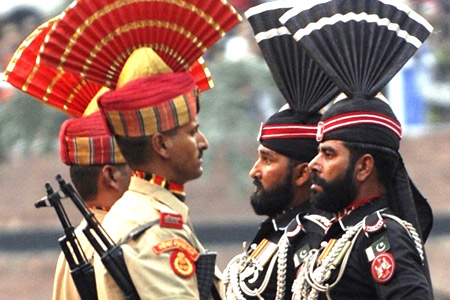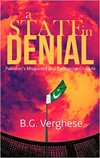A State in Denial: Pakistan's misguided and dangerous drusade
This preface from a posthumously released book on Pakistan lucidly explains why Kashmir has never been the core issue in the India-Pakistan 'stalemate'. Verghese argues that Pakistan’s lack of identity and the abdication of its rich syncretic Sufi heritage have set the country dangerously adrift.
By B G VERGHESE
New Delhi, June 2016

Calibrated hostility at the Wagah Border between India and Pakistan during the daily flag lowering ceremony.
A NATION in denial, Pakistan is in a state of deep crisis. Its fledgling, born-again democracy is threatened by internal dissension, self-made jihadi extremism, provincial rivalry and the looming presence of an army that remains a state within the state. Yet, there are emerging and increasingly articulate forces that recognize that Pakistan must reimagine and reinvent itself from the Indian ‘other’ to restore the identity it foolishly abandoned at birth.
Muhammad Ali Jinnah so wanted to distance his ‘nation’ from the parent state that he abandoned its soul and defined it emphatically, solely and negatively as ‘not India’—India being a permanent, existential Hindu enemy.
His famous 11 August 1947 speech to the constituent assembly of Pakistan revealed his utter confusion. It was virtually censored and later withdrawn by his own government, as he had not merely repudiated the two-nation theory on the basis of which Pakistan had been born but had also, astonishingly, confessed in plain terms that he had little to say about the future of Pakistan as he had not thought about it sufficiently!

BG Verghese
Pakistani textbooks in state schools distort, omit and reconstruct the country’s social and political history in an extraordinary brazen manner. The Jinnah Institute, Islamabad, reviewed these textbooks in 2012 and described them as filled with a ‘curriculum of hate’
The denial by Pakistan of its history, geography and culture has caricatured reality. Pakistan has proclaimed itself an Islamic state, but has defined Islam in narrow sectarian terms. It has moved from being Muslim to becoming increasingly radical, trying hard to establish that it is ‘Muslim enough’. It has dedicated itself to something called ‘the ideology of Pakistan’—a strange constitutional term—and is committed to defending ‘the ideological frontiers’ of Pakistan, whatever and wherever they be.
The Constitution it conferred on Pakistan-administered Kashmir (PAK) in 1974, and modified in 1990, ordained that fundamental rights shall be subject to the ‘ideology of accession to Pakistan’, and made acceptance of this ideology a part of the oath of office of all leading functionaries and members of the legislative assembly (MLAs). Such actions are—and there’s no mild way of putting it—pure gobbledygook.
Based on this, official Pakistani textbooks in state schools distort, omit and reconstruct the country’s social and political history in an extraordinary brazen manner. The Jinnah Institute, Islamabad, reviewed these textbooks in 2012 and described them as filled with a ‘curriculum of hate’– hate of India and of Hindus.
To reinvent itself, Pakistan at one time tried to describe itself as West Asian and contemplated a confederation with Iran and Turkey in the abortive USA-sponsored Regional Cooperation for Development (RCD). It joined the Central Treaty Organization (CENTO) or the Baghdad Pact and has since been the sword arm of a number of West Asian, especially Sunni monarchies, crowning this position with possession of the ‘Islamic’ bomb.
Having denied its identity ab initio, Pakistan has been a state in constant denial ever since. This is documented in cast iron terms in the record of Indo-Pakistan diplomatic correspondence between 1947 and 2007. More damning have been the self-confessions of Pakistani actors, military and civil, in graphic and unapologetic terms. The plea always is, ‘Let’s move on, never mind the repeated perfidy and innocent lives lost. After all, we are today the worst victims of terror anywhere.’ Maybe. But these are Pakistan’s terrorists—raised, trained, armed, supported, launched, funded and shielded by it, to strike India and others.
 Now, some of these monsters, more Islamist than Pakistan bargained for, have turned against it; Islamabad dare not get off the tiger’s back. Much of this has happened with the most perfidious American and British assistance—damn the collateral damage.
Now, some of these monsters, more Islamist than Pakistan bargained for, have turned against it; Islamabad dare not get off the tiger’s back. Much of this has happened with the most perfidious American and British assistance—damn the collateral damage.
War, tensions and cross-border terror have alternated with talks to manage or prevent conflict and seek a peaceful settlement. There have been such contrapuntal exchanges since 1947. India too has erred on occasion. But it has, by and large, sought to be accommodative and reconciliatory. It is not irredentist. It makes no claims on Pakistan. But Pakistan, alas, has an undefined ideology and ideological frontiers to defend. For it, Kashmir is the ‘core’ issue, together with the Indus waters. Everything else is hostage to a settlement of these two issues on its terms, irrespective of the UN (United Nations) Resolutions on Jammu and Kashmir (J&K), now effete, and the Indus Waters Treaty.
Kashmir and the Indus waters are, however, far from being the ‘core’ issues. They are consequences, not causes, of the endless stalemate. The real core issue is Pakistan’s lack of identity or anchorage.
Edward Lear, in his collection, Complete Nonsense, asks, ‘Who, or why, or which, or what, Is the Akond of Swat?’ The same question may be addressed to Pakistan.
Pakistan has also to come to terms with its true Islamic heritage—a soft, humanistic, syncretic, Sufi-infused Islam, rather than the narrow, revivalist and fundamentalist Wahhabi Islam that has been imposed on its people as ‘the ideology of Pakistan’
The last ‘akond’, Minagul Aurangzeb, was incidentally in school with me in united India and remained a loving friend till the end. We often met and exchanged greetings, the last time on the occasion of Eid in August 2014. He was an ill man and tragically died a day later. With men and women like Aurangzeb—and there are many others—all proud Pakistanis, but dedicated to secularism, peace and cooperation with India—we shall overcome.
Pakistan has also to come to terms with its true Islamic heritage—a soft, humanistic, syncretic, Sufi-infused Islam, rather than the narrow, revivalist and fundamentalist Wahhabi Islam that has been imposed on its people as ‘the ideology of Pakistan’.
World Islam is in crisis. It is sorely in need of another renaissance imbued with the spirit of ‘ijtihad’ (or innovation, and an ‘independent or original interpretation of problems not precisely covered by the Quran, Hadith and Ijma’), which the Prophet himself ordained and which, not so long ago, heralded a glorious era of Islamic civilization, science and culture.
It is argued by some of the severest Pakistani critics that Pakistan has been there for sixty-eight years and is here to stay. It cannot be wished away. True enough. But it is, with Israel, the only ideological state in the world and continues to be chained to an ideology that is confused, illiberal and ill-suited to a modern state. This is truly Pakistan’s core issue.
India cannot afford to sneer at or stand aloof from such an inference. It must assist in change. This is the challenge. Even incremental success could be transformative. If the right efforts are made, the issues of Kashmir and waters could be resolved.
I have cited many foreign authors and responsible Pakistani sources, so as not to make it possible for anyone to dismiss this text as an Indian rant and pure propaganda. Indians, too, must know the truth, and understand that India is arguing and acting from a position of strength—so that this nation can make those concessions that are necessary.
Peace has its victories, no less renowned than war.
A State in Denial - Pakistan's Misguided and Dangerous Crusade by B G Verghese, was published and released by Rupa Publications, India, in early 2016. The Preface is reprinted here with the kind permission of Rupa.
See a collection of writings at www.BGVerghese.com / Veteran columnist, developmental journalist, author, and Magsaysay Award winner, BG Verghese started his career with the Times of India and was later Editor of the Hindustan Times (1969-75) and the Indian Express (1982-86). He was Information Adviser to the Prime Minister (1966-69), a Gandhi Peace Foundation Fellow for some years after the Emergency and Information Consultant to the Defence Minister for a short period during 2001. He was later with the Centre for Policy Research, New Delhi. Verghese passed away on 30 December, 2014, his pen busy right until the end.
Post a comment
- HOME
- BUSINESS
- DEVELOPMENT
- ENERGY
- ENVIRONMENT
- HEALTH
- INFORMATION
- POLITICS
- SECURITY
- SHIPPING
- SOCIETY
- TRAVEL
- TRENDS
Long term impact of Gaza attack on Israel
Consequences of Palestinian conflict and finger-pointing in the blame game ... See world opinion
Curse of curation
PR-speak is turning our conversations into outright gibberish... more…
